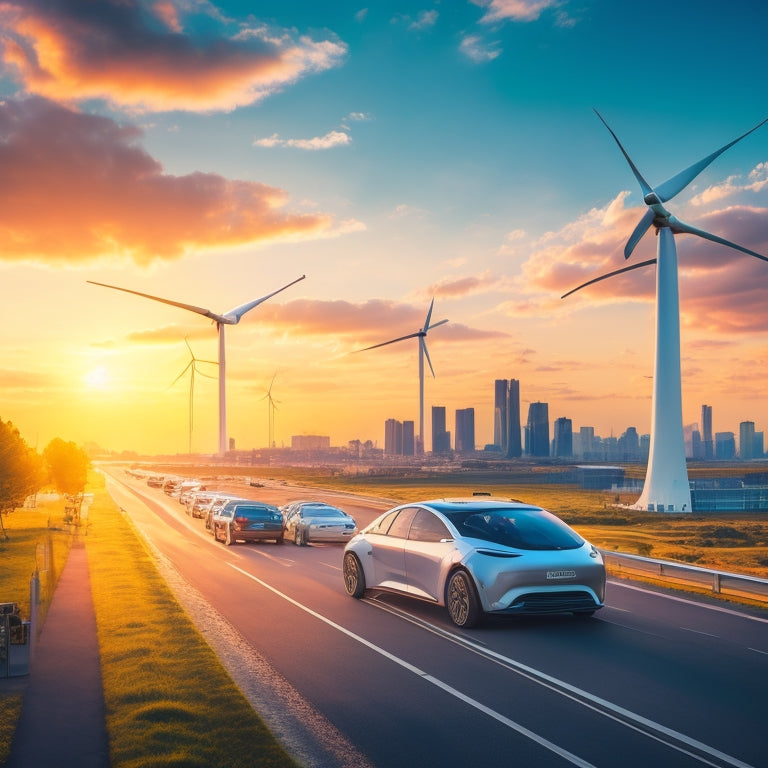
Switch to Clean Energy Vehicles for Savings
Share
By shifting to clean energy vehicles, drivers can greatly reduce their environmental footprint while also enjoying substantial cost savings through lower fuel and maintenance expenses. Electric vehicles offer a smoother, quieter ride and access to federal tax credits and incentives, making the shift more accessible. Additionally, drivers can choose from over 150 EV models, ensuring a suitable option for every driver. As the world continues to move towards a more sustainable future, exploring the benefits of clean energy vehicles is essential for a cleaner, more cost-effective tomorrow. Explore the many advantages of making the switch and discover a greener, more affordable way to drive.
Key Takeaways
• Switching to electric vehicles reduces fuel costs, saving you money on transportation expenses.
• Lower maintenance expenses for EVs result in additional cost savings over time.
• Federal tax credits and incentives make switching to clean energy vehicles more accessible and affordable.
• With over 150 EV models available, drivers can choose a clean energy vehicle that fits their budget and lifestyle.
• By reducing emissions, clean energy vehicles contribute to a cleaner environment, improving air quality and public health.
Benefits of Electric Vehicles
With over 150 electric vehicle (EV) models available, drivers can now enjoy a range of benefits that make switching to an electric vehicle a smart choice for both the environment and their wallets. One significant advantage is lower emissions, contributing to a cleaner environment and improved air quality.
Additionally, EVs offer cost savings, with reduced fuel costs and lower maintenance expenses compared to traditional gas-powered vehicles. By switching to an electric vehicle, drivers can enjoy a smoother, quieter ride while also doing their part for the environment.
With federal tax credits and incentives available, making the switch to an electric vehicle is now more accessible than ever.
Driving on Clean Energy
Clean energy sources, such as solar and wind power, offer a viable alternative to fossil fuels, reducing pollution and greenhouse gas emissions that contribute to climate change. By driving on clean energy, we can greatly reduce emissions and improve air quality.
Here are four ways to make a positive impact:
-
Reduce emissions: Switch to electric vehicles, which produce zero tailpipe emissions, reducing air pollution and greenhouse gas emissions.
-
Improve air quality: Power your home appliances with clean energy, reducing reliance on fossil fuels and decreasing air pollution.
-
Promote sustainable transportation: Encourage the development of clean energy infrastructure, supporting the growth of electric vehicles and public transportation.
- Support renewable energy: Invest in solar and wind power, reducing our reliance on fossil fuels and mitigating climate change.
Generate Clean Electricity
Switching to 100% renewable energy sources, such as solar and wind power, is an essential step towards reducing our dependence on fossil fuels and addressing climate change. By generating clean electricity, we can greatly reduce greenhouse gas emissions and mitigate the impact of climate change.
One effective way to do this is by installing solar panels with battery storage. This not only decreases energy bills but also guarantees electricity availability even during utility outages. With GreenPrime, homeowners can upgrade to 100% renewable energy and support clean energy generation.
Frequently Asked Questions
Can I Charge My EV From a Standard Outlet at Home?
Did you know that 80% of EV owners charge their vehicles at home? Yes, you can charge your EV from a standard outlet at home, but make sure Outlet Safety and Home Wiring can support the increased load, considering Charging Speed and potential Outlet Upgrades, to seamlessly integrate into your Daily Habits.
Are Electric Vehicles Suitable for Long Road Trips?
When considering long road trips in electric vehicles, route planning is essential to alleviate charging anxiety, ensuring access to convenient and reliable charging stations, thereby making EVs a suitable option for extended travel.
Do Electric Vehicles Have Less Cargo Space Than Gas Vehicles?
Like a puzzle piece, electric vehicles cleverly optimize cargo space within their sleek dimensions, often rivaling their gas-powered counterparts, with many models offering surprisingly spacious interiors and clever storage solutions, debunking the myth of cargo constraints.
Can I Install an EV Charger Myself or Do I Need a Professional?
When considering EV charger installation, prioritize Charger Safety by engaging a licensed electrician to guarantee correct wiring and grounding, avoiding potential electrical hazards, and reducing Installation Costs in the long run.
Will an Electric Vehicle Still Work During a Power Outage?
During a power outage, an electric vehicle can still function with backup systems, such as energy storage solutions like battery storage, ensuring continued mobility and minimizing disruptions.
Related Posts
-

What Tax Deductions Apply to Sustainable Building Materials?
You can claim various tax deductions for sustainable building materials, thanks to over 40 federal tax incentives sup...
-

7 Best EV Battery Health Trackers for Homeowners
You can maximize your electric vehicle's performance and lifespan by leveraging advanced battery health trackers that...
-

10 Best Energy-Efficient External Hard Drives for Sustainable Offices
When it comes to sustainable offices, you need external hard drives that balance data storage needs with energy effic...


